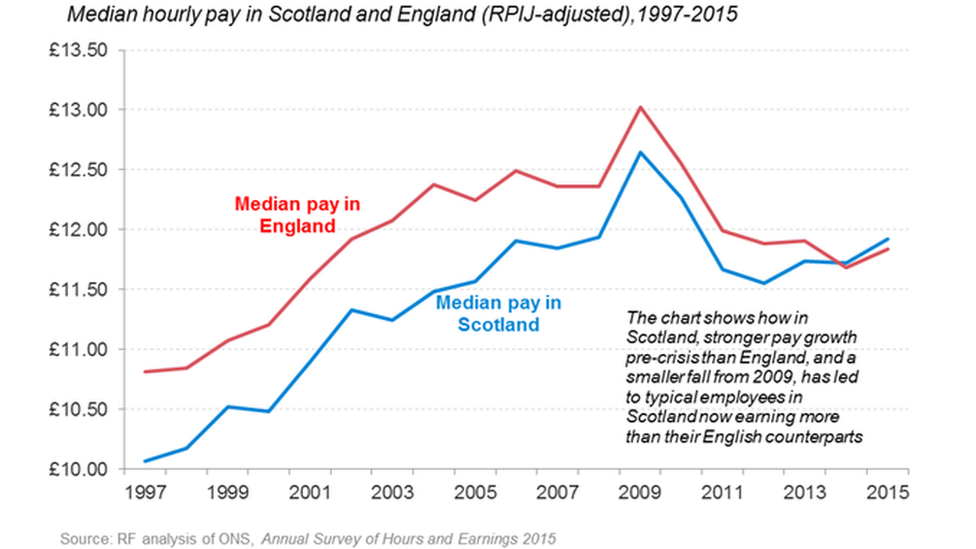Typical Scottish worker's pay tops England for first time
- Published

The typical pay of a Scottish worker has risen above those in England for the first time, according to a new study.
The Resolution Foundation said there is a need to keep the jobs market growing if the figure to be retained.
It said a significant low pay problem persists, and predicted that one in six Scottish workers will still be on low pay in 2020.
The London-based think tank will publish its full report on Wednesday.
It argues that tackling low pays should be a priority for campaigners in the Holyrood elections this spring.

By Douglas Fraser, BBC Scotland Business/economy editor
The Scottish economy has been doing a lot of catching up with the rest of the UK in the past 20 or so years. It closed the gap in growth of economic output, in employment and unemployment, and now, we learn, in pay as well.
The Resolution Foundation report does not spell out the reasons why median pay has caught up and surpassed that of the middle-earning English worker, but there are some likely explanations.

The long-standing gap in median pay was closing last decade, before the financial crash took place.
In 2004, hourly pay was 7.2% lower than in England. Five years later, that had reduced to 2.9%.
That is a measure of the wage earned by the median worker - the one in the mid-point between the highest and lowest earners, with exactly the same number of people earning more as were earning less.
That figure avoids the distortion of the average, which can be lifted by small numbers of extremely high earners, who are more likely to live in London and south-east England.
When the recession struck, Scottish workers faced a shallower decline in pay than in England.
In 2014, for the first time, median Scottish pay rose above that in England, and by last year, there was a small advantage: £11.92 per hour to £11.84 in England.
The Resolution Foundation analysed figures from the Office for National Statistics to find that Scotland's median pay rose at a faster rate than any other nation or region in the UK over the past two decades. North-east England was second fastest.

The think tank report argues that steady growth, high employment and improved productivity were behind the relative improvement in pay during last decade.
It goes on to say that continued jobs growth and productivity improvements will be required if the "pay premium" is to be maintained.
Median pay should be affected by the introduction of a higher statutory minimum wage from April, which the UK government has dubbed the national living wage, and which will only apply to those aged at least 25.
Conor d'Arcy, a research analyst at the Resolution Foundation, said the continuing low pay problems in Scotland would be improved if more people were moved on to the independently-calculated Living Wage.
It is higher than the statutory level and calculated to be the lowest level of earnings necessary for basic needs.
Mr d'Arcy said: "Scotland's impressive pay performance has been underpinned by high employment and steady economic growth, particularly in the run up to the crash. But its recent employment and growth record has been less impressive.
"While Scotland's strong pay growth has been good news for many workers, it is still the case that one in five employees is low paid.
"With the higher minimum wage for the over-25s expected to reduce rather than eliminate low pay, tackling this longstanding problem should be a top priority for parties in the run-up to May's election."
- Published17 January 2016